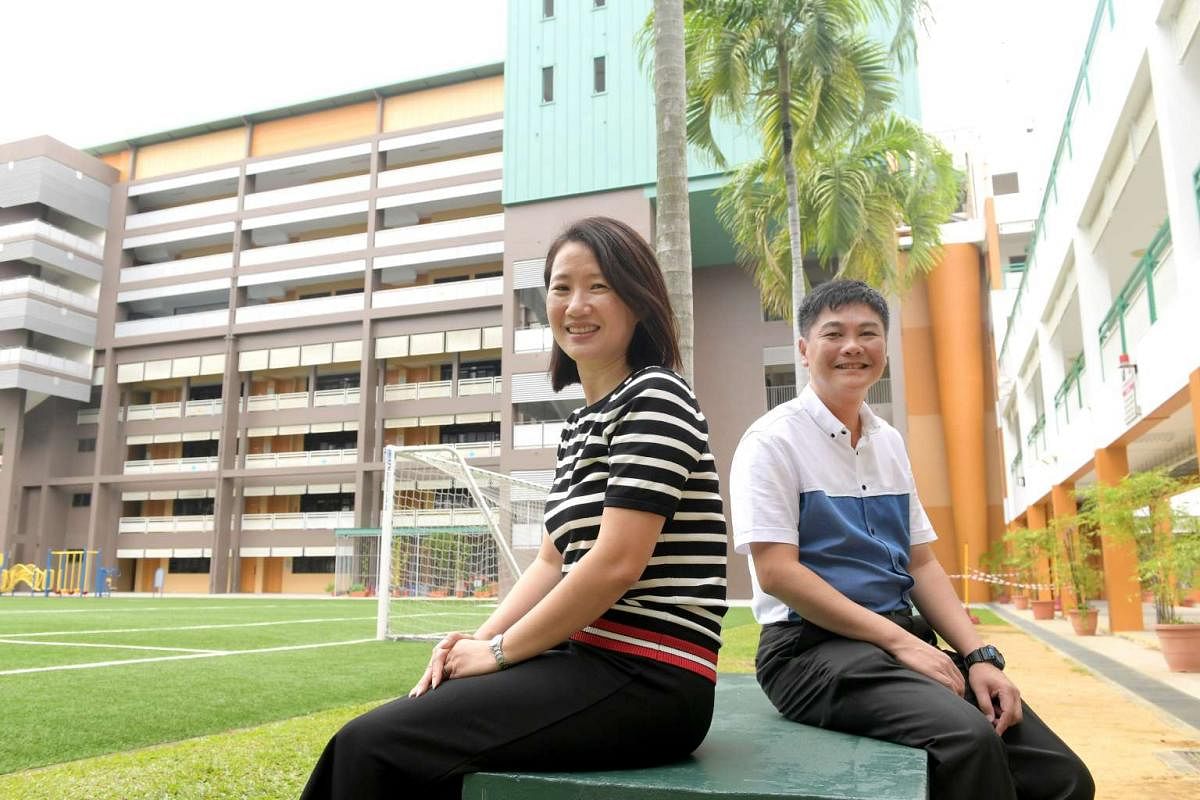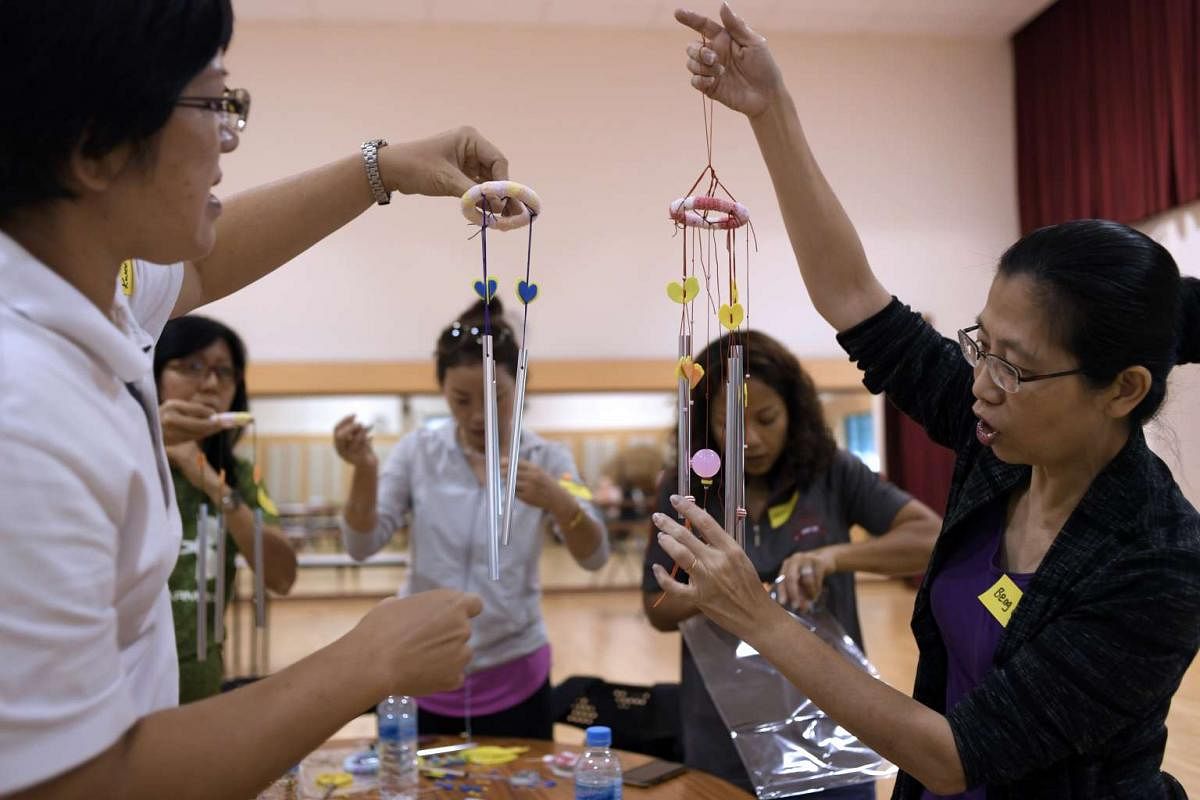-
Sign up for ST parenting classes
-
How do you teach your child to distinguish real news from alternative facts? Can you create a home environment that fosters both a love of learning and an ability to think critically?
The Straits Times will be organising its first series of parenting masterclasses to help parents understand how to provide their children with life skills that cannot always be taught in the classroom.
Conducted by teaching specialists Debra Ann Francisco and David Tay from ST Schools, as well as expert trainers, the workshops are targeted at parents with children aged five to 12.
They will impart parenting skills such as guiding children to read the news critically and supporting them in acquiring essential mathematics knowledge.
Parents can also learn how to enhance their children's language abilities through reading about current affairs and better engaging in daily communication.
A total of six different workshops will be held at the Singapore Expo on March 18 and 19 from 10am to 5.30pm as part of SmartKids Asia, the largest educational children's event in the region.
SmartKids Asia is organised by Sphere Exhibits, the events arm of Singapore Press Holdings, which is also the parent company of ST.
The parenting workshops will last for up to an hour each. Tickets are available online at www.smartkidsasia.com and cost $16.05 for one session or $48.15 for a single-day pass, which will allow access to five sessions.
Fifty lucky ST readers who RSVP online at http://bit.ly/2mzn7Fi will receive a free pair of single- day passes to The Straits Times Parenting Masterclasses.
For details on the giveaway, call 6590-3403 or e-mail trurong@sph.com.sg.
Meet the super parent volunteers
Some are so dedicated, they are still volunteering years after their children have left the school



Many Singaporeans know about parent volunteers in schools - those adults who do what it takes to help their children get into popular, primary schools.
They are not all so pragmatic, though.
Madam Jenny Wee certainly is motivated by a wider purpose. She volunteers at the primary school her three children went to, even though her youngest child left it 16 years ago.
Her children are now working professionals, aged between 28 and 34, but the 60-year-old housewife still volunteers at Fuhua Primary School, where she is the chairman of the school's parent support group for parent volunteers.
An appreciation of teachers is one key reason she has been a parent volunteer for the past 20 years.
"The teachers care so much about the kids. We can support the teachers too," says Madam Wee, who adds that she wants to change the mindset of parents who tend to complain about teachers, rather than try to understand and support them in their work.
When she was most involved in the school, she was there almost every day. She still volunteers at least once or twice a week now.
Apart from occasional grassroots volunteer work at a community centre, she also serves at two secondary schools as a programme coordinator for the government's FamilyMatters@School scheme, which equips parents with skills to nurture family relationships.
She says she does not feel out of place even though there are much younger parents around. This is partly because there are a handful of older parent volunteers in their 40s and 50s, whose children also left Fuhua years ago.
"There's a sense of belonging, that's why we stay on. Some of the older teachers who have been here for many years have become our friends," says Madam Wee.
She is among the dedicated parents who often volunteer for years at their children's schools, motivated by reasons as varied as wanting to know more about the school environment, desiring to give back to society and strengthening their relationship with their kids.
For Mr Razali Omar, 47, a programme administrator in the education services industry, being a parent volunteer has proved somewhat addictive since he started about six years ago.
From four fathers in the parent volunteer group at CHIJ (Katong) Primary when he joined, he has seen the number of dad volunteers there grow to about 400.
His elder daughter, now in Secondary 3, used to study in the school and his younger daughter is in Primary 5 there now.
He says his first volunteer activity involved helping students approach tourists for their comments during a heritage tour in Kampong Glam.
He felt satisfaction in helping and encouraging the students, and has initiated other volunteer projects such as getting fellow dads to perform a One Direction song for Children's Day a few years back.
For active parent volunteers with regular work hours such as Mr Razali, volunteering can take up a lot of mental energy.
He estimates that meetings can take place on average a few times a month, on weekday evenings or on Saturdays, and he takes the occasional half-day leave to attend volunteer events.
While meetings may not clock too many hours, communication regarding volunteer plans and preparations, via WhatsApp group chats, for instance, can take place almost daily.
But he bears this load with ease.
"When I see how my volunteering helps the school, it seems lighter to me. When you're in volunteer mode, you just want to keep contributing," says Mr Razali, who also gives free tuition.
He found that other volunteer activities such as going on nature trails with other schoolchildren could even benefit his own kids, whom he could better guide in their science homework.
Several years ago, he asked his elder child Ira Erika Razali if she wanted him to go to a volunteer event as she might be embarrassed to see him in school.
She told him not to go, but apparently changed her tune. He was happy to learn later that she thought he was a "cool" dad for volunteering.
Volunteerism in Singapore schools has skyrocketed, with a more than five-fold percentage spike in the past 20 years or so.
About 98 per cent of primary schools, secondary schools and junior colleges now have Parent Support Groups, compared to 17 per cent in 1998, according to a Ministry of Education spokesman.
"On average, Parent Support Groups have about 30 to 50 active parents, with others volunteering on an ad-hoc basis," says the spokesman.
"The strong involvement of parents reflects the efforts of our schools in fostering stronger partnerships with parents, as they recognise that their children's learning and holistic development will benefit from these positive partnerships."
Parenting specialist Sarah Chua, from non-profit organisation Focus on the Family Singapore, says many benefits come with parent volunteering: "Research shows that children with involved parents often enjoy greater academic success and develop positive attitudes towards school."
But she cautions parents against misusing such volunteering opportunities to keep tabs on their offspring because this may impede their growth in learning to become independent.
Sociologist Paulin Tay Straughan says the rise in parent volunteerism is driven not only by the authorities, but also by a culture of "intensive parenting". This is where many families have fewer children and devote more time and resources to one or two children, says Dr Straughan, an associate professor at the department of sociology at National University of Singapore.
Mrs Sarojini Padmanathan, a council member of Families for Life, an organisation that promotes resilient families, says it is not only stay-at-home parents who are parent volunteers; working parents can volunteer to provide snacks for youth in junior college who study in the school library at night.
Ms Yan Chui Leng, 40, an assistant human resources director at a hospital, uses whatever spare time she has to volunteer.
She is among the parent volunteers who are organising six workshops for pupils of Poi Ching School during the upcoming March holidays, including sessions for fencing and baking cupcakes.
Planning activities during the school holidays can take two months' preparation, says Ms Yan. Besides monthly meetings with the Parents Support Group, she could be making phone calls in the early morning or at night, and dealing with frequent e-mail and WhatsApp group chat messages.
With two daughters in Primary 2 and 3 at the school, and a third in the second year of kindergarten who will enter Poi Ching next year, she feels invested in the school.
"Being a parent volunteer helps me to know better the culture of the school where each of my daughters will be spending six years. This helps me relate to my children better," she says.
"We can contribute to an enriching school life for not only our children, but other students too."
The parent support group at Poi Ching is also "given a voice in the decision-making process", says a teacher from the school, Mr Abdul Mohamed, 39.
These decisions can involve choosing vendors such as those who provide school bus services or uniforms, he says. Parent volunteers recently took part in a food-tasting session to decide on a canteen vendor, he adds.
Parents have diverse volunteer opportunities, including supporting school events such as Racial Harmony Day and Children's Day; accompanying school children on field trips; organising charity projects; and carrying out regular tasks such as directing traffic at the school carpark at the start of school.
They can also attend parenting talks and workshops, accompanied by their children, to participate in bonding activities such as making terrariums or playing laser tag.
Freelance writer and housewife Wong Sher Maine, 42, values the relationships she has forged as a parent volunteer for about seven years.
It can be solitary being a freelance writer working from home, says the former journalist.
She says: "I don't have a workplace, but I am a familiar face at the school, where I go to 'work'. There's a community there.
"I first signed up because I was curious about the school, now it's the friendships there that are driving me more than anything else."
She enjoys learning new skills and catching up with other parents at workshops for parent volunteers such as a recent one for making wind chimes.
The bulk of her volunteer work has been at Ngee Ann Primary School, which started when her eldest son was in Primary 1. Now 13, he is a student at Ngee Ann Secondary School, where she also volunteers. Her two daughters, aged nine and 11, are now at the primary school.
Her volunteer involvement fluctuates, ranging from about twice a week when the children were younger to a more ad-hoc commitment now.
As her family does not employ a domestic helper, she sometimes has to juggle her freelance work, her volunteer activities and doing household chores.
A trained pianist and violinist, she has helped some pupils improve their singing and musical performances for Teacher's Day celebrations.
"They're very grateful and will give me a hug. It seems like very little, but you feel warm inside. You feel like they appreciated your help. It's memorable when you build a relationship with a student who's not your kid," she says.

He is 'daddy' to the pupils
Mr Mohamed Jamaluddin Abdullah, 43, became a better parent volunteer after attending a workshop last year organised by the Centre for Fathering. The session aimed to equip dads with skills to build lasting relationships with their children.
It opened up his mind, says Mr Jamaluddin, a driver of heavy vehicles in the construction industry. He realised the importance of communicating well with his four children, aged four to nine. His wife, administrative clerk Sharifah Saliza Abdul Sharif, 37, is expecting their fifth child.
He says he had a lonely childhood as his adoptive parents seemed to favour their two biological children who were born after they adopted him.
"I couldn't talk to my adoptive dad and never got any praise from him," he recalls of the man who died when he was about 11 years old.
He had signed up as a parent volunteer in his eldest child's school about two years ago when his son, Mohamed Afiq Danial Mohamed Jamaluddin, entered Primary 1. Another son, age seven, is now also in the school.
Attending the parenting workshop made him less critical and more communicative as a dad. It also helped him realise that "every child needs attention".
"Initially, I volunteered only because of my child. After the workshop, I felt that I have to give not only to my child, but also to other children," he says.
Despite his irregular work hours and a part-time job as a taxi driver, he tries to take part in as many parent volunteer events as he can.
For instance, he sometimes makes use of a two-hour gap in his work schedule to help out when parent volunteers are needed for some pupils' swimming classes.
His eldest son is now in Primary 3 and the boy's friends are familiar with Mr Jamaluddin as he is a frequent parent volunteer.
He says: "Some of his friends call me 'teacher'. Some call me 'Afiq's daddy', some just call me 'daddy'. I see their smiles and I feel 'wow'."
Join ST's Telegram channel and get the latest breaking news delivered to you.
A version of this article appeared in the print edition of The Sunday Times on March 05, 2017, with the headline Meet the super parent volunteers. Subscribe

